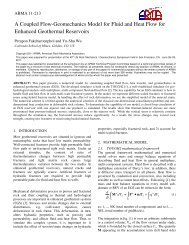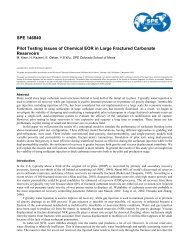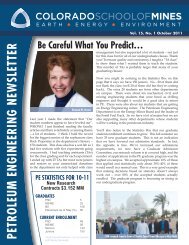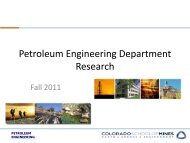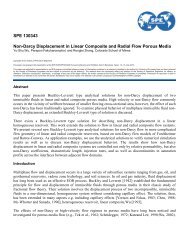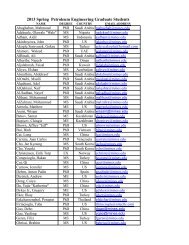2001 Alumni Newsletter - petroleum engineering colorado school of ...
2001 Alumni Newsletter - petroleum engineering colorado school of ...
2001 Alumni Newsletter - petroleum engineering colorado school of ...
You also want an ePaper? Increase the reach of your titles
YUMPU automatically turns print PDFs into web optimized ePapers that Google loves.
teach a course on reservoir<br />
modeling or<br />
well testing. You see,<br />
the enrollment in the<br />
Department was very<br />
high around year 1980<br />
and, as I recall, we had<br />
511 students signed up<br />
in <strong>petroleum</strong> <strong>engineering</strong>!<br />
Everybody on the<br />
staff was very busy and<br />
the Department needed<br />
help. With permission<br />
Hossein Kazemi<br />
from Marathon, I said<br />
yes to Craig. Thus, my<br />
second career began then as an adjunct pr<strong>of</strong>essor.<br />
I taught one course a semester at night—<br />
mostly graduate courses. Then, I began doing<br />
research with graduate students. This was<br />
really fun because I wanted to continue being<br />
a researcher while I was managing the Engineering<br />
Department and later the entire Reservoir Technology<br />
in Marathon. The rest is history and it<br />
simply indicates that I was very lucky to receive<br />
that phone call from Craig.<br />
Recently Marathon decided to close its<br />
world-class technology center because <strong>of</strong> pressure<br />
from both inside and outside. I decided to stay<br />
in Colorado instead <strong>of</strong> going to Houston for purely<br />
personal reasons. While I miss the heavy involvement<br />
in the business side <strong>of</strong> <strong>petroleum</strong> exploration<br />
and production, I am beginning to devote my<br />
energies to my first love, which is the academia.<br />
Now, I am planning to teach two courses in the<br />
daytime and increase my involvement in conducting<br />
research. In fact, I have proposed to Craig that<br />
we establish a Center for Reservoir Studies at<br />
the Department to conduct practical research on<br />
subjects <strong>of</strong> interest to the industry. A further<br />
goal is to conduct such research in a timely<br />
and cost-effective manner using the Department’s<br />
high-class resources as well as outside help<br />
from local world-class experts we know. We<br />
will pursue this rigorously.<br />
As for me, I taught three courses last<br />
spring—one senior course and two graduate courses.<br />
I had a great time because two <strong>of</strong> the courses<br />
were new for me. I wanted to share with my students,<br />
in addition to the required academic material,<br />
the experiences <strong>of</strong> my pr<strong>of</strong>essional career in the<br />
business world. It worked very well! Thanks to<br />
Craig for the opportunities.<br />
This semester I teach the first course<br />
in reservoir simulation and compositional simulation.<br />
I am also working with a couple <strong>of</strong> graduate<br />
students on topics <strong>of</strong> interest to me—especially,<br />
gravity drainage in fractured reservoirs and<br />
understanding mass transfer mechanisms in such<br />
reservoirs.<br />
I am excited for the opportunity to work<br />
with the students, the faculty and the staff in<br />
the PE, who have welcomed me to their workplace.<br />
Thank you all—especially Dee and Chris.<br />
Mark Miller<br />
The computing resources in our department<br />
received a big boost this past year. A large<br />
donation from Marathon, in combination with<br />
student technology fees, allowed us to open a<br />
graduate student computing lab. The new lab<br />
brings together state-<strong>of</strong>-art workstations with<br />
industry s<strong>of</strong>tware, allowing graduate students<br />
to work on industrial strength problems. With<br />
all <strong>of</strong> the new machines,<br />
we were able to put<br />
older machines into<br />
graduate <strong>of</strong>fices. We<br />
also set up a new server,<br />
added printers, and completely<br />
rewired the first<br />
floor. Keeping up with<br />
the constantly changing<br />
technology is a priority<br />
for the department.<br />
It also keeps me busy.<br />
Academically, I<br />
have been working with<br />
Richard Christiansen on<br />
developing programming<br />
laboratories for<br />
our undergraduate stu-<br />
Mark Miller<br />
dents. Rather than learn FORTRAN or C++, we<br />
are teaching our students the fundamentals <strong>of</strong><br />
programming using a tool that they will likely<br />
have when they leave Mines: Excel. Well not<br />
exactly Excel, Visual Basic for Applications. This<br />
tool allows engineers to greatly extend the capability<br />
<strong>of</strong> Excel. It also can make the infamous<br />
“Tarner” senior project easier.<br />
Field session was spent in California this<br />
summer. I particularly enjoyed it, having spent<br />
several summers working there. While it seemed<br />
that there had been some growth and change,<br />
much was the same. AERA did an exceptional<br />
job <strong>of</strong> providing our students with a look at what<br />
<strong>petroleum</strong> <strong>engineering</strong> entails and the kinds <strong>of</strong><br />
jobs they can expect to be doing. As always,<br />
more about field session activities can be found<br />
in Bill Eustes’s section.<br />
13



